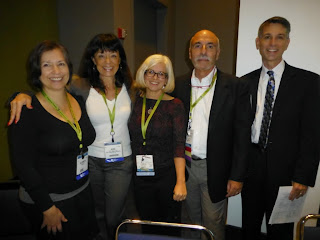 |
| Sarah Verdon, Sharynne, Kate Crowe at the entrance to the exhibit hall |
This week is the American Speech-Language-Hearing Association Convention in Chicago, IL. I was on the Issues in Culturally and Linguistically Diversity topic committee, so was invited to review many papers earlier in the year. While at ASHA I am co-presenting 6.5 hours of technical reports and seminars including a 3-hour short course:
Crowe, K., McLeod, S., McKinnon, D. H.,
Fordham, L., & Ching, T. Y. C. (2013, November). Language choice for children with hearing loss: Influences on caregiver
decision-making. (30 minute oral
presentation). [Winner of
the ASHA student prize for best abstract in Cultural and Linguistic Diversity
Topic]
 |
| Kate Crowe |
McLeod,
S., Bowen, C., Verdon, S., & Guiberson, M. (2013). Empowering monolingual SLPs to work with multilingual children with speech sound disorders. (3 hour short course)
 |
| Mark Guiberson, Sharynne, Caroline Bowen and Sarah Verdon planning our 3 hour short course |
McLeod, S. & Verdon, S. (2013, November). A systematic review of tools to assess
children’s speech in languages other than English. (30 minute oral
presentation)
 |
| Sarah Verdon and Sharynne at ASHA 2013 |
McLeod, S., Verdon, S., Bowen, C. &
International Expert Panel on Multilingual Children’s Speech (2013, November). Aspirations
of an international expert panel for working with multilingual children with
speech sound disorders. (30 minute oral presentation).
 |
| Members of the International Expert Panel on Multilingual Children's Speech after our presentation |
|
McLeod , S., Crowley,
C. J., Williams, A. L., Louw, B., Westby, C.,
To , C. K. S., Washington, K. N., & MacLeod, A. A. N. (2013). Beyond Spanish: Competencies for SLPs working
with children from diverse cultures. (2 hour seminar).
 |
| Beyond Spanish seminar presenters: Sharynne, Karla Washington, Carol To, Lynn Williams, Andrea MacLeod, Brenda Louw, Carol Westby, Cate Crowely |
Washington, K. McLeod, S., Devonish, H., &
Samms-Vaughan, M. (2013, November). Cross-cultural competencies for
working with bi-dialectal children from Jamaica. Paper (20 minute oral
presentation within a 2-hour seminar).













